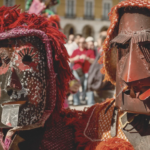Portugal has been recognized several times by some of the most important magazines in the world as one of the best tourist destination. And this small country in the coast of Europe has a lot to discover. From the gastronomy to the nature places, Portuguese cities are a true cultural wealth.
But besides all the things you probably already read on the international publications, there are many things you probably don’t know about Portugal. Let’s find out some of them!
Portugal is the oldest Nation-State in Europe
Since 1139 that Portugal keeps the same borders, which makes it the oldest country in Europe!
Besides that, it has a strategic location on the Southwest of the continent, next to the Atlantic Ocean, making it a great starting point for a road trip through Europe.
There’s a holiday where people throw garlic
On the night of June 23rd-24th, Portuguese people fill the streets to celebrate São João. This festival is celebrated in the entire country, but especially in Porto, in the North of Portugal.
In this city it´s very common to see people with plastic hammers banging on each other´s heads. If you want to visit the city during this festival, we advise you to run away from the garlands of garlic.
It is the country of the biggest wave someone has ever surfed
Portugal has some amazing beaches to surf. One of the most famous, Nazaré, was the place where consecutively the biggest wave was surfed – first in 2011 by the Hawaiian Garret McNamara and later in 2017 by the Brazilian Rodrigo Koxa.
Are you feeling brave enough to try? Our campervans are perfect for a surf trip!
Lisbon is older than Rome
Lisbon is around four centuries older than Rome. In fact, this is the second oldest capital in Europe. The oldest is Athens.
The Alliance between Portugal and England is the oldest one still in force
In 1373 Portugal and England signed the Anglo-Portuguese treaty. Both countries participated in wars to defend each other. United Kingdom helped Portugal in the Iberian Peninsular War and Portugal was part of World War I to help UK.
Portuguese is the eighth most spoken language in the world
There are around 205 million Portuguese speakers and 240 million total speakers, which make Portuguese the eighth most spoken language in the entire world.
Portugal is the country responsible for the British love for tea
It was the Portuguese Catarina de Bragança, who was married with King Charles II of England, who took this habit to the British court.











